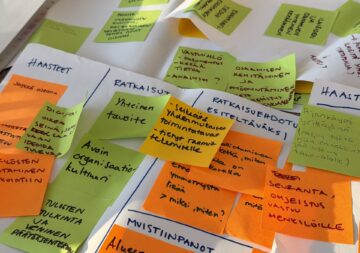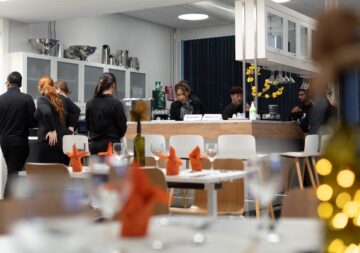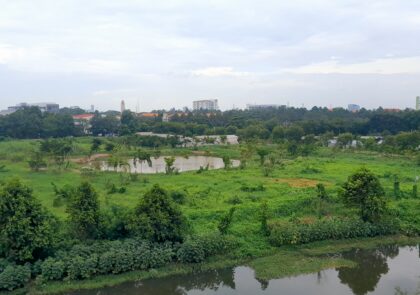
In an increasingly globalized world, the movement of people across borders—expatriates, international students, and digital nomads—has become commonplace. However, integration into new cultural and professional environments often poses significant challenges. These challenges could be met by developing a structured framework for an international educational center designed to support cultural integration and professional development, using the example of Krasnaya Polyana, Russia.
Authors: Mariia Molodkina & Jukka Sirkiä
Imagine a classroom without walls, its ceiling the blue Caucasus sky, where every dialogue is meant to expand what Vernadsky once called the planet’s “thinking layer” (Lahoz-Beltra 2014,1). That is the essence of noospheric education—an approach that fuses ecological attentiveness, ethical reflection and intercultural collaboration into a single learning act (Jaseckova et al. 2022, 236). In Krasnaya Polyana, Russia, we explored practical implementations of this educational philosophy, converting underused resort facilities into vibrant learning spaces. Here, local residents, digital nomads, and expatriate children engage in collaborative activities, cultivating intercultural fluency and ecological consciousness simultaneously.
The Relevance of Educational Integration
Krasnaya Polyana is renowned for its Olympic legacy and thriving tourism, fostering a diverse international community. Such diversity highlights the limitations of traditional language courses and cultural orientation sessions, typically employed for integration. Through our practical investigations and stakeholder discussions—including input from local educators, expatriates, and regional authorities—we confirmed that a holistic educational approach significantly enhances expatriate integration. The integration strategy we propose combines skill-based education, intercultural dialogue, and professional networking, ensuring long-term adaptability and community participation.

Picture 1. Krasnaya Polyana (Image: Mariia Molodkina)
Exploring Effective Educational Strategies
The research methodology included comparative case studies of successful international educational centers, stakeholder interviews—including educational administrators, expatriates, and policymakers—and extensive literature review, two innovative strategies emerged as particularly impactful (Ruslin et al. 2022, 4):
- Noospheric education: This pedagogical method integrates ethical awareness, ecological responsibility, and intercultural skills; not only does it align with UNESCO’s global education guidelines (UNESCO 2022, 142), but it also resonates with sustainable education principles recognized worldwide (Jaseckova et al. 2022, 236).
- Sociocratic governance: This decision-making approach involves all stakeholders equally, fostering greater community engagement and adaptability. Sociocracy creates a participative environment where expatriates and locals collaborate meaningfully, ensuring that educational outcomes align closely with community needs (Wilder 2022, 7).
Practical Insights from Krasnaya Polyana
In Krasnaya Polyana, the pioneering educational initiative known as ”The Heart” became our real-world case study. Crucially, we observed that effective integration relies significantly on active engagement from local stakeholders, including regional businesses, educational institutions, and municipal authorities. Such involvement not only ensures the programs’ relevance to local conditions but also contributes substantially to their sustainability and community acceptance.
”The Heart” provides compelling evidence that innovative education models like the noospheric approach and sociocratic governance not only work effectively at a local level but also possess scalability potential. Indeed, our analysis of international case studies and expressions of interest from educational partners from diverse cultural contexts, such as Bali and Dubai, indicate robust global applicability.
Recommendations and Strategic Insights
For those seeking to replicate or adapt our model, three key recommendations emerged:
- Engage local businesses and municipal authorities early to secure program sustainability and community relevance.
- Adopt noospheric principles actively, embedding ecological awareness and ethical thinking into all learning activities.
- Implement sociocratic governance structures to facilitate inclusive, community-based decision-making processes.
Ultimately, innovative educational strategies such as those developed in Krasnaya Polyana offer practical, scalable pathways to meaningful expatriate integration. By embracing ecological ethics, community engagement, and intercultural dialogue, educational centers worldwide can foster a genuinely integrated global community. According to research, a comprehensive strategic framework that bridges theory and practice, as well as local specificity and international scalability, provides a strong foundation for this development (Molodkina 2025, 78).
References
Jaseckova, G., Konvit, M., & Vartiak, L. 2022. Vernadsky’s concept of the noosphere and its reflection in ethical and moral values of society. History of Science and Technology. Vol. 12 (2), 231-248. Cited 14 May 2025. Available at https://doi.org/10.32703/2415-7422-2022-12-2-231-248
Lahoz-Beltra, R. 2014. The ”crisis of noosphere” as a limiting factor to achieve the point of technological singularity. Interdisciplinary Description of Complex Systems, 1 – 30. Cited 14 May 2025. Available at http://arxiv.org/abs/1405.3378. 10.7906/indecs.16.1.7.
Molodkina, M. 2025. Developing a strategic framework for an international educational center: A scalable model for cultural integration and professional development. Master’s thesis. LAB University of Applied Sciences, Master of Business Administration, Business Innovation Culture and Creativity. Lahti. Cited 26 May 2025. Available at https://urn.fi/URN:NBN:fi:amk-2025052315324
Ruslin, Mashuri, S., Rasak, M. S. A., Alhabsyi, F., & Syam, H. 2022. Semi-structured interview: A methodological reflection on the development of a qualitative research instrument in educational studies. Proceedings of the 2nd UUM International Qualitative Research Conference, 1–15. Cited 14 May 2025. Available at https://www.qualitative-research-conference.com
UNESCO. 2021. Reimagining our futures together: a new social contract for education. REPORT FROM THE INTERNATIONAL COMMISSION ON THE FUTURES OF EDUCATION. Paris: United Nations Educational, Scientific and Cultural Organization. Cited 14 May 2025. Available at https://doi.org/10.54675/ASRB4722
Wilder, H. 2022. Does sociocracy support student voice? Student perceptions of a student council using sociocracy in a public school. Holistic Education Review. Vol. 2(2), 1–11. Cited 21 May 2025. Available at https://her.journals.publicknowledgeproject.org/index.php/her/article/view/1455
Authors
Mariia Molodkina is a student at the LAB University of Applied Sciences in a master’s degree program in Business Innovation Culture and Creativity.
Dr. Jukka Sirkiä is a Senior Lecturer at LAB University of Applied Sciences. He has solid experience in customer-oriented business management of IT service companies and, in addition to his Senior Lecturer duties, works as a project expert in the business unit of LAB University of Applied Sciences.
Illustration: https://pxhere.com/en/photo/783382 (CC0)
Reference to this article
Molodkina, M. & Sirkiä, J. 2025. Innovative Educational Models for Expatriate Integration: The Krasnaya Polyana Framework. LAB Pro. Cited and date of citation. Available at https://www.labopen.fi/lab-pro/innovative-educational-models-for-expatriate-integration-the-krasnaya-polyana-framework/






